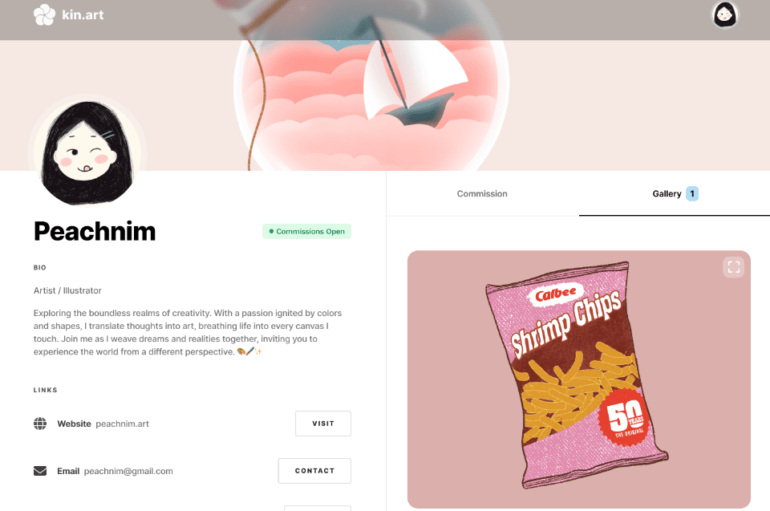TL;DR:
- Kin.art introduces a tool to prevent AI models from training on artwork without artists’ consent.
- Generative AI models like DALL-E 3 can turn text descriptions into art, often without artists’ knowledge.
- Kin.art’s solution, co-developed by Flor Ronsmans De Vry, employs image segmentation and tag randomization.
- The tool aims to disrupt the model training process by making it harder to use the artwork.
- Kin.art’s tool is free but requires artists to upload their work to their portfolio platform.
- The company plans to offer the tool as a service for broader use in the future.
Main AI News:
In the realm of generative AI, particularly within the domain of text-to-image AI models like Midjourney and OpenAI’s DALL-E 3, the capabilities are nothing short of astonishing. These image-generating models possess the unique ability to transform virtually any description, whether concise or elaborate, into art that could easily be mistaken for the work of a seasoned artist.
However, a significant concern looms over the horizon. Many of these models, if not the majority, have been trained using artwork without the knowledge or consent of the artists. Although some conscientious vendors have initiated efforts to compensate artists or provide mechanisms to opt out of model training, a considerable number have not.
In the absence of definitive guidance from the legal and legislative spheres, a wave of entrepreneurs and activists has taken it upon themselves to develop tools that empower artists to safeguard their creations from being unwittingly utilized in training GenAI models. Among these innovative solutions is Nightshade, unveiled just this week, which subtly alters the pixels of an image to deceive models into perceiving it differently from its actual content. Another such tool, Kin.art, leverages image segmentation, concealing portions of artwork, and tag randomization, effectively shuffling the metadata associated with an art piece, thereby disrupting the model training process.
Kin.art’s tool, launched today, is the collaborative brainchild of Flor Ronsmans De Vry, co-founder of Kin.art, an art commissions management platform, alongside Mai Akiyoshi and Ben Yu, and it promises to usher in a new era of art protection in the digital age.
In an exclusive interview, Ronsmans De Vry elaborated on the nuances of art-generating models, explaining that these models rely on datasets of labeled images to establish connections between written concepts and images. This entails associating terms like “bird” not only with bluebirds but also with parakeets, bald eagles, and more abstract representations. By introducing disruptions either in the image itself or the labels linked to a piece of art, the task of utilizing the artwork in model training becomes considerably more challenging for vendors.
“Creating a harmonious coexistence between traditional art and generative art has become one of the primary challenges confronting the art industry,” Ronsmans De Vry conveyed via email to TechCrunch. “We firmly believe that it begins with an ethical approach to AI training, one that respects the rights of artists.“
Ronsmans De Vry asserts that Kin.art’s groundbreaking tool possesses certain advantages over existing solutions, primarily because it does not necessitate costly cryptographic modifications to images. Nevertheless, it can be seamlessly integrated with such methods to offer additional layers of protection.
“While other tools on the market aim to mitigate the damage after your artwork has already been included in a dataset through poisoning,” Ronsmans De Vry emphasized, “our solution is designed to prevent your artwork from being inserted into these datasets in the first place.”
While Kin.art’s tool is currently offered free of charge, artists are required to upload their artwork to Kin.art’s portfolio platform for utilization. It is evident that the tool is strategically positioned to guide artists towards Kin.art’s fee-based art commission-finding and -facilitating services, a key aspect of their business.
Yet, Ronsmans De Vry underscores the philanthropic aspect of their endeavor, pledging that Kin.art intends to extend the availability of the tool to third parties in the future.
“After rigorous testing on our own platform, our plan is to offer it as a service, allowing both small websites and large platforms to effortlessly protect their data from unauthorized use,” he affirmed. “In an era dominated by AI, owning and safeguarding your platform’s data is more critical than ever. Some platforms have the luxury of gating their data, preventing non-users from accessing it, but others are obligated to provide public-facing services and lack this privilege. This is precisely where solutions like ours come into play.”
Conclusion:
Kin.art’s innovative tool addresses a critical issue in the art industry by allowing artists to protect their work from unauthorized AI training. This move aligns with the growing need for ethical AI training and respects artists’ rights. It also positions Kin.art to potentially expand its services beyond its platform, catering to a broader market seeking data protection solutions in the age of AI.

